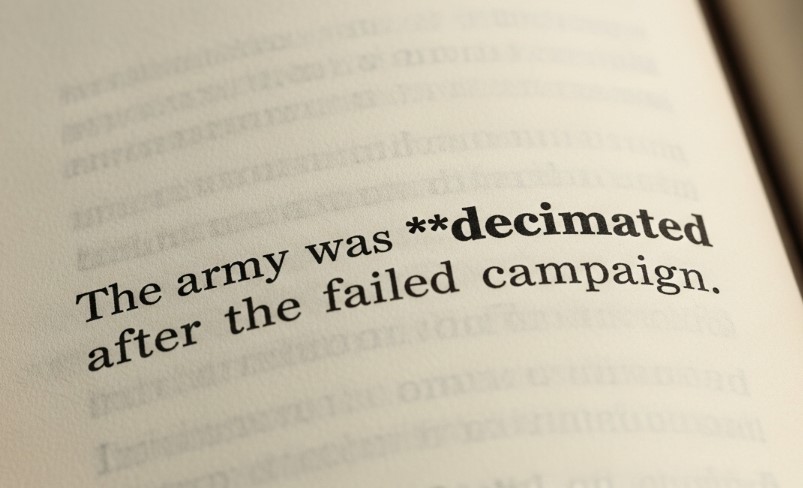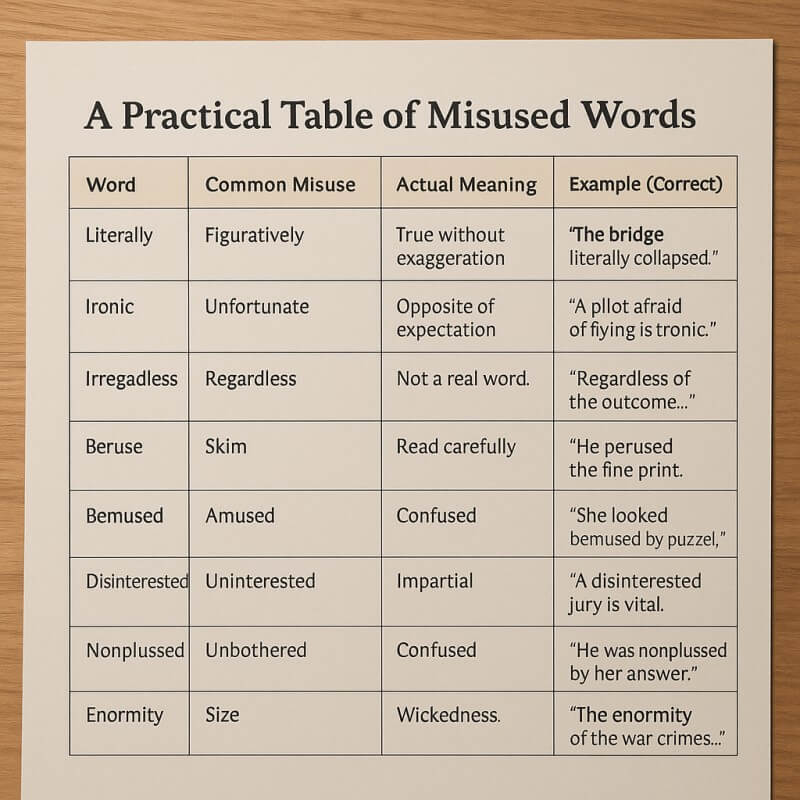Language evolves, and English is no exception. Yet, one thing that remains constant is our tendency to misuse words. Sometimes the mistake comes from confusing sound-alike terms. Other times, people stretch a word beyond its original meaning until it becomes something else entirely.
The result? Misunderstandings in everyday conversations, embarrassing slips in professional writing, and even heated debates about who is “right.”
The concrete answer is this: many of the words we misuse are not wrong because of laziness or ignorance. They are misused because the meaning of words shifts over time, or because dictionaries accept both traditional and popular uses.
Still, if you want to write and speak clearly, you need to know the difference between how people use a word and what it technically means.
The Most Misused Words in English
@pau_nigeria Think you know English? You might be misusing these 5 common words! Are there other commonly misused words or expressions that you know? Please share in the comments section. #panatlanticuniversity #englishtips #grammar #fyp
Below is a detailed exploration of some of the most misused words. Each entry includes the common misuse, the actual meaning, and examples of correct usage.
1. Literally

- Misuse: Used to emphasize something, even when it’s not true.
- “I literally died of laughter.”
- Actual Meaning: Something that is true without exaggeration.
- “The glass literally shattered into a hundred pieces.”
- Note: Dictionaries now recognize the “emphasis” meaning because it’s so common, but in formal writing, stick to the traditional definition.
2. Ironic
- Misuse: Describing something merely unfortunate or coincidental.
- “It’s ironic that it rained on my wedding day.”
- Actual Meaning: A situation where the outcome is the opposite of what you’d expect.
- “A fire station burning down is ironic.”
- Tip: Think of irony as an unexpected contradiction.
3. Unique
- Misuse: Something unusual, rare, or special.
- “That’s a very unique idea.”
- Actual Meaning: The only one of its kind. It cannot have degrees.
- “DNA is unique to each individual.”
- Better Alternatives: Instead of “very unique,” use “unusual,” “exceptional,” or “rare.”
4. Irregardless

- Misuse: Used as a fancy version of regardless.
- Actual Meaning: There is no such word in standard English. Irregardless is a double negative (“ir-” + “less”). Correct form: regardless.
- Wrong: “Irregardless of the rules, I’ll go.”
- Correct: “Regardless of the rules, I’ll go.”
5. Peruse
- Misuse: To skim or glance over.
- Actual Meaning: To read carefully and in detail.
- “She perused the contract before signing.”
6. Bemused
- Misuse: Amused or entertained.
- Actual Meaning: Confused or bewildered.
- “He looked bemused by the complicated instructions.”
7. Disinterested
- Misuse: Uninterested, bored, lacking concern.
- Actual Meaning: Impartial, unbiased, having no personal stake.
- “We need a disinterested judge for the case.”
- Correct Contrast: “Uninterested” means bored. “Disinterested” means neutral.
8. Nonplussed

- Misuse: Unfazed, not bothered.
- Actual Meaning: Surprised and confused, unsure how to react.
- “She was nonplussed by the unexpected question.”
9. Enormity
- Misuse: Great size or scale.
- “The enormity of the skyscraper.”
- Actual Meaning: Great wickedness or moral outrage.
- “The enormity of the crime shocked the world.”
10. Factoid
- Misuse: A small fact, trivia.
- Actual Meaning: Something that appears factual but is false. Coined by Norman Mailer to describe misinformation repeated until believed.
- “The idea that humans use only 10% of their brain is a factoid.”
11. Redundant
- Misuse: Repetitive or unnecessary in general speech.
- Actual Meaning: In employment, it specifically means laid off because your job is no longer needed.
- “After the merger, many workers were made redundant.”
12. Ultimate

- Misuse: The best or most extreme.
- Actual Meaning: The final or last in a series.
- “The ultimate chapter of the book.”
13. Infer vs. Imply
- Misuse: Swapping the two.
- “She implied from his silence that he was guilty.”
- Actual Meaning:
- Imply = to suggest without saying directly.
- Infer = to draw a conclusion based on evidence.
- Correct Example:
- “She implied guilt through her tone.”
- “He inferred guilt from her tone.”
14. Theory
- Misuse: A guess or speculation.
- “I have a theory that my neighbor is stealing my mail.”
- Actual Meaning (Scientific): A well-substantiated explanation of facts, backed by evidence.
- “Evolution is a scientific theory supported by decades of research.”
15. Decimate

- Misuse: Destroy completely.
- Actual Meaning: To kill one in ten. Originates from Roman military punishment.
- “The army was decimated after the failed campaign.”
16. Nauseous
- Misuse: Feeling sick.
- Actual Meaning: Causing nausea.
- “The nauseous smell made him sick.”
- Correct Alternative: “I feel nauseated.”
17. Plethora
- Misuse: A large amount (positive).
- Actual Meaning: An excessive, often unwanted amount.
- “The meeting included a plethora of unnecessary details.”
18. Alibi
- Misuse: An excuse.
- Actual Meaning: Proof you were elsewhere when a crime happened.
- “His alibi placed him in another city during the robbery.”
19. Chronic
- Misuse: Severe or intense.
- Actual Meaning: Long-lasting or recurring.
- “She suffers from chronic back pain.”
20. Obsolete
- Misuse: Rare or outdated in style.
- Actual Meaning: Completely out of use, replaced by something newer.
- “Floppy disks are obsolete.”
Broader Patterns of Misuse
Looking at these examples, a few patterns emerge:
- Exaggeration for emphasis: Words like literally and unique are stretched to mean “very” or “special.”
- False friends and near-synonyms: Disinterested vs. uninterested confuse many because they sound so similar.
- Shifts in everyday English: Dictionaries adapt, but careful writers still need to distinguish formal from casual meanings.
- Borrowed meanings from pop culture: Words like factoid changed meaning once journalists and TV shows misused them often enough.
A Practical Table of Misused Words

How to Avoid Misusing Words
- Check the dictionary—but the right one. Online slang glossaries may list popular meanings, but formal sources like Merriam-Webster and the Oxford English Dictionary give nuance.
- Pay attention to context. Scientific, legal, and academic contexts often use stricter definitions.
- Avoid filler emphasis. Words like literally or unique often act as verbal crutches. Replace them with more precise terms.
- Read widely. Exposure to professional writing (journals, newspapers, essays) reinforces proper usage.
Final Thoughts
The most misused words in English often reveal how flexible and evolving the language is. Of course, there are still plenty of words that people actually hate to hear or use. While misuse does not always equal “wrong”—after all, dictionaries often update to reflect usage—it can still undermine clarity. If you want your writing to be sharp, your arguments credible, and your conversations impactful, aim for precision.
So next time you feel tempted to say literally when you mean figuratively, or call something “very unique,” pause. English gives you a whole vocabulary of alternatives. Using the right one isn’t about being pedantic—it’s about being understood.

